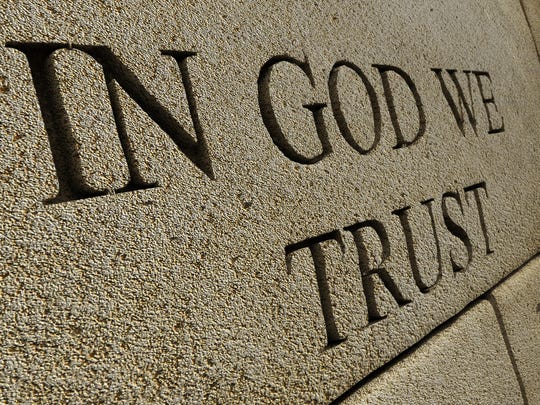As public school students in Kentucky are entering their schools, they are being greeted this fall with a new sign mandated by the Kentucky legislature. It states, “In God We Trust.” Each school district is given choices as to what the signage will look like, but it must be placed in a prominent location.
Shelby County students will see a large professionally done sign that has a backdrop of an American flag and the name of the school district below the motto. They will know from this that God and patriotism are uniquely connected and that all the staff in their school district trust in God.
Fayette County, on the other hand, simply posted a slightly enlarged print of a dollar bill. This was done to point to the history of placing the motto on coinage and paper money. Let’s follow the history lesson approach.
Where did the phrase, “In God We Trust” come from? Despite tortuous twisting of our history by many, this phrase was not used by our founders, nor was it part of our founding historical documents.
In 1864, a minister named M.R. Watkinson wrote to Secretary of the Treasury Salmon P. Chase and stated, “From my heart, I have felt our national shame in disowning God as not the least of our present national disasters.” He felt that the Civil War was God’s punishment for not naming him in our Constitution.
He urged Chase to stamp some kind of recognition of God on our coins. Chase passed the request on to the head of the U.S. Mint, James Pollock, who just happened to be the vice president of the National Convention to Secure the Religious Amendment of the Constitution of the United States (later the Christian Amendment Movement).
The goal of this group was to hold a constitutional convention to change the wording of the preamble of our Constitution so that it would recognize God and his law as supreme and Jesus Christ as “the Lord of all.” (This group lobbied for the preamble change 17 times between 1874 and 1969.)
Pollock suggested “In God We Trust.” Chase OK’d that, and it was done. No approval from Congress was necessary for the design on the coins.
Fast forward to 1954. Our country was in a fury over communism. The government was embroiled in a hunt for communist sympathizers within government and outside of it. The term “Godless Communists” was repeated often in public and private conversations. The government added “under God” to the Pledge of Allegiance and “In God We Trust” to paper currency and postage stamps.
A Florida senator named Charles E. Bennett, a devout Christian and chairman of the House International Council for Christian Leadership, proposed changing our national motto from the one used since our founding, E Pluribus Unum (from many, one) to “In God We Trust.” Eager to prove that they were neither godless nor communists, Congress agreed with the senator.
Fast forward again to 2019. The Kentucky legislature, driven by the same Christian nationalism that inspired all the other characters involved in “In God We Trust” over the years, decided to use our public schools to further promote this agenda.
The goal has always been the same — to use government to promote God/Christian belief and to codify the claim that our country has been a “Christian nation” since the founding. Plus, subscribers to these beliefs are not done yet. Just check “Project Blitz” online.
Since the Kentucky “In God We Trust” law also allows teachers/staff/school boards to post other historical documents, parts of documents, etc. in the schools, may I suggest that someone have a nice sign made depicting the Preamble to our national Constitution. It should be posted in the same “predominant” place as “In God We Trust.”
The preamble states that we can build a nation and make it successful if we all ordain it and bless it ourselves. No gods mentioned. Plus, the founders actually wrote it.
Linda Allewalt is a longtime advocate for separation of church and state. She resides in Shelbyville.

Comments
Post a Comment